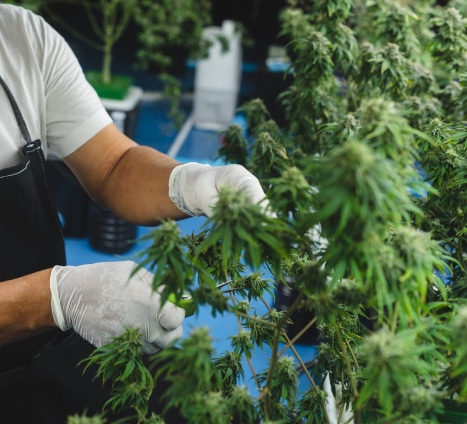How to Get a Cannabis License in Wisconsin
In light of marijuana legalization, Wisconsin has seen significant progress in its cannabis industry. Wisconsin’s cautious approach toward cannabis legislation contrasts sharply with the wave of legalization sweeping across the United States. Currently, the state strictly regulates cannabis use, allowing only CBD derived from hemp and prohibiting both medical and recreational marijuana.
Let’s understand how to get a cannabis license in Wisconsin, and the intricate legal landscape around cannabis, shedding light on existing regulations, potential legislative changes, and their implications for interested stakeholders.


Cannabis License Regulations in Wisconsin
Understanding the application process thoroughly is key to obtaining a Wisconsin cannabis license. Entrepreneurs must familiarize themselves with the Wisconsin Department of Agriculture, Trade, and Consumer Protection responsible for regulating the cannabis business landscape.
You must adhere to all requirements outlined by local authorities to secure your cannabis licenses successfully. Developing a solid business plan is essential for navigating the application process smoothly.
Types of Cannabis Licenses in Wisconsin
Potential cannabis business owners have sparked interest among the community to legalize recreational movement in Wisconsin. Still, there is an absence of a legal framework for medical or recreational cannabis means no licenses are available for cannabis-related activities. However, the state has established regulations for hemp-derived CBD, reflecting a nuanced stance on cannabis products.
Cultivation
Wisconsin regulates hemp cultivation under laws adapted after the 2018 Farm Bill. Hemp cultivators must comply with state licensing requirements, which include submitting detailed plans and adhering to THC concentration limits.
Manufacturing
Given the current prohibition of cannabis, Wisconsin does not issue manufacturing licenses for cannabis products. CBD manufacturing from legally cultivated hemp is allowed, subject to state and federal regulations. The medical cannabis legalization in Wisconsin has opened doors for the cannabis industry. Entrepreneurs can sell and possess CBD oil-containing medicines by adhering to state regulations.
Distribution
Distribution licenses for cannabis do not exist in Wisconsin due to its illegal status. Hemp and CBD products can be distributed within the state’s legal framework, ensuring they meet the required standards for legal hemp-derived products.
Lab Testing
Without legal cannabis, there’s no licensing for lab testing of cannabis products. Hemp-derived CBD products must still meet quality standards, likely necessitating testing for compliance with federal and state laws.
Retail
Access to Wisconsin dispensaries is contingent upon obtaining the necessary cannabis license. Wisconsin’s prohibition extends to retail outlets for cannabis, rendering cannabis dispensaries illegal. CBD products derived from hemp can be sold in various retail settings, provided they comply with state guidelines.
Cannabis Event Organizers
Currently, there are no provisions for licensing cannabis event organizers in Wisconsin due to the overarching prohibition on cannabis use and sales.
Microbusiness
The concept of a cannabis microbusiness license is not applicable in Wisconsin’s current legal framework, with no allowances made for small-scale, vertically integrated cannabis operations.
How to Get a Cannabis License in Wisconsin?
The pathway to obtaining a cannabis license in Wisconsin remains closed, pending significant legislative changes. For hemp cultivation, interested parties must navigate a series of regulatory requirements, including application procedures, compliance with THC thresholds, and adherence to agricultural best practices as mandated by state and federal laws.
Remaining Compliant with Wisconsin Regulations
Remaining compliant in Wisconsin means steering clear of unauthorized cannabis activities while adhering to the regulations governing hemp and CBD products. This involves careful monitoring of THC levels in hemp, ensuring CBD products do not make unverified health claims, and staying abreast of any changes in state law.
Compliance with Wisconsin marijuana laws is imperative for operating a legally sound cannabis business. The legalized medical marijuana market in Wisconsin presents lucrative opportunities for entrepreneurs.
Risk and Compliance Factors
Engaging in unauthorized cannabis activities in Wisconsin carries substantial legal risks, including fines and imprisonment. Compliance demands vigilance in adhering to hemp regulations and preparedness for potential shifts in the legal landscape.
Final Thoughts
Wisconsin’s current cannabis policy presents a complex challenge for advocates and potential business owners. With the state’s laws firmly set against legalization, any progress in the cannabis sector is contingent on significant legislative change. Stakeholders must remain informed and engaged, ready to adapt to new developments in this evolving area.
Legal References and Citations
Wisconsin’s legal stance on cannabis is detailed in the Wisconsin Uniform Controlled Substances Act, which outlines the penalties for cannabis possession, sale, and cultivation, and sets the legal framework for hemp-derived CBD.
Additional Resources
For the latest updates and comprehensive guidance, stakeholders are encouraged to consult the Wisconsin State Legislature’s website, NORML for information on decriminalization efforts, and the FDA for regulations on CBD.
FAQ Section
Is medical marijuana legal in Wisconsin?
No, with CBD oil as a limited exception for certain medical conditions.
Can I open a dispensary in Wisconsin?
No, dispensaries for cannabis are currently prohibited.
Are there any plans to legalize cannabis in Wisconsin?
There have been proposals and discussions, but significant opposition remains.
The landscape for cannabis in Wisconsin is characterized by strict regulations and significant legal challenges. However, the state’s approach to hemp and CBD products indicates a degree of openness to cannabis-derived products within a legal framework. Stakeholders interested in the cannabis sector must navigate this complex environment carefully, staying informed of legal requirements and potential changes in legislation.